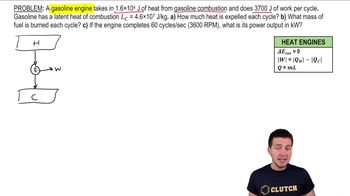Here are the essential concepts you must grasp in order to answer the question correctly.
Thermal Efficiency
Thermal efficiency is a measure of how well an energy conversion process converts input energy into useful output energy. It is defined as the ratio of the useful work output to the total energy input, often expressed as a percentage. In this context, it helps determine how effectively the generator converts the energy from diesel fuel into electrical energy.
Recommended video:
Thermal Efficiency & The Second Law of Thermodynamics
Energy Density
Energy density refers to the amount of energy stored in a given volume or mass of a substance, typically expressed in units like MJ/gal or J/kg. For diesel fuel, the energy density indicates how much energy can be extracted from a gallon of fuel when burned. Understanding energy density is crucial for calculating the total energy input to the generator from the fuel consumed.
Recommended video:
Power Output
Power output is the rate at which energy is produced or consumed, measured in watts (W) or kilowatts (kW). In this scenario, the generator's power output is given as 15 kW, which indicates the electrical energy it generates per unit time. This value is essential for comparing against the energy input derived from the fuel to assess the generator's efficiency.
Recommended video:
Power Output of a Gasoline Engine



